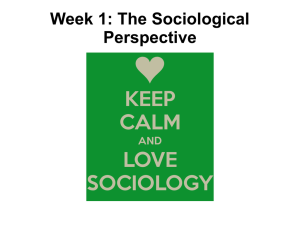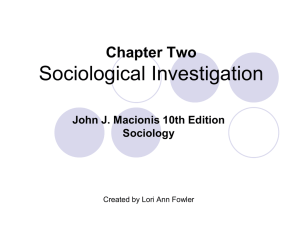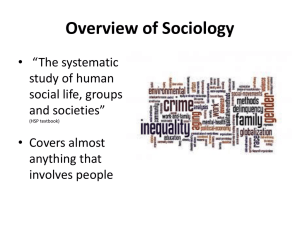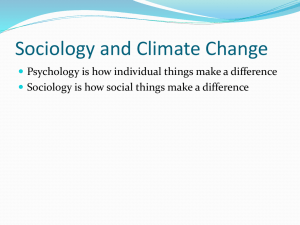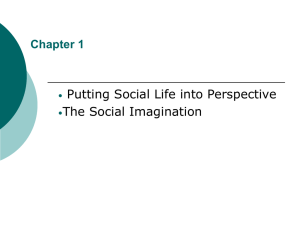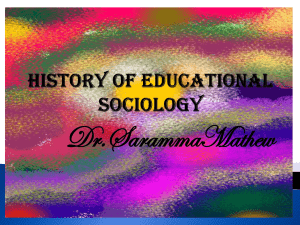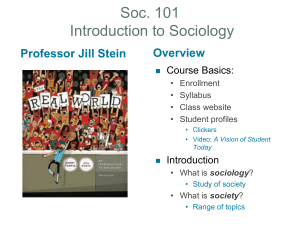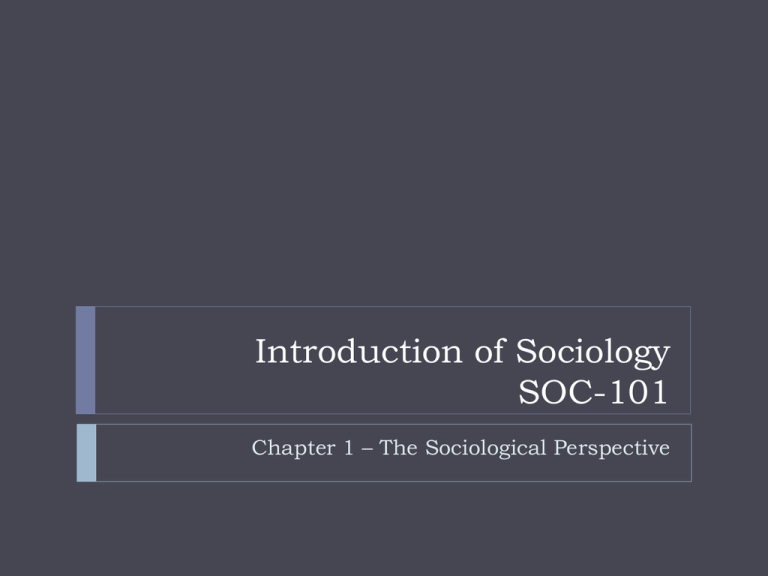
Introduction of Sociology
SOC-101
Chapter 1 – The Sociological Perspective
Sociological Perspective
Sociology
The scientific study of society and human behavior
Sociological Perspective
Understanding human behavior by placing it within its broader
context
Stresses the social contexts in which people live
Looks at how people are influenced by their society and how
social forces affect human behavior
“The Sociological Imagination”
A term coined by C. Wright Mills refers to being able to look beyond
common sense for explanations of why people act the way they do
How do groups influence people?
How are people influenced by their society?
Sociological Perspective
Social Location
Sociologists study ones social location to understand human
behavior
These are the parts of life that people occupy because of
where they are located in their society
Examples of social locations are jobs, education, gender, race,
etc.
Social Location can shape our ideas of who we are and what
we should attain in life
External Influences
Sociologists that it is the external influences, not genetics,
become part of our thinking and motivations
Sociological Perspective
Three main parts to the sociological perspective:
Seeing the general in the particular
Sociology helps use see general patterns in the behavior of
particular individuals
Though each individual is unique, society acts differently on
various categories of people (e.g., children compared to adults,
women to men)
Seeing the strange in the familiar
When we look at life sociologically, it requires giving up familiar
ideas that human behavior is simply a matter of what people
decide to do, in favor of the initially strange notion that we are
creatures of society
Sociological Perspective
Seeing individuality in social context
Social diversity prompts us to wonder why other people think
and act differently than we do
Social Marginality – Those on the outside of society tend to
sense the power of society more than those inside
Social crisis can also help us see that society is responsible for
changes in our lives, not just the individuals
Benefits of the sociological perspective:
Helps us critically assess the truth of commonly held
assumptions
Helps us see the opportunities and constraints in our lives
Empowers us to be active members of our society
Helps us live in a culturally diverse world
Origins of Sociology
Traditions To Science
Pre-Scientific Age
Humans have always been trying to understand society and
question why things happen
People answers were usually found in myth and superstition
Scientific Revolution (16th–17th c.)
Rise of science and the use of the scientific method in areas
such as chemistry and physics began to explain the previously
unexplainable
Many mysteries were explained, shattering the foundations of
many traditions
Origins of Sociology
The Age of Enlightenment and Revolution (18th c.)
During this time period there were a number of blows to
tradition
The philosophes of the Enlightenment promoted ideas of
inalienable rights and the nature of man
The American and French Revolutions caused people to
rethink social life
The Industrial Revolution (19th c.)
This was a period of huge social upheaval
Many left rural lives to move to the cities where they worked
in horrendous conditions with low pay where even children
had to work
Origins of Sociology
Sociology emerged in the middle of the 1800’s during a
period of social upheaval
The Industrial Revolution challenged traditional ideas
about social life
The scientific method, which was used in the physical
sciences, led to the birth of Sociology
Auguste Comte
(1798-1857)
Auguste Comte (1798-1857)
Auguste Comte (1798-1857)
Experienced the upheaval of the French Revolution and the
reign of Napoleon
He was the first to coin the term “sociology” in 1838 to
describe his new way of looking at the world
“Armchair Philosopher”
Drew his conclusions from informal observations on social life rather
than research
Positivism
Application of scientific approach to the social world
Believed that society operates according to certain laws just as
the physical world operates according to the laws of nature
Auguste Comte (1798-1857)
Comte came up with one of the first theories of social
evolution
Theological Phase
Metaphysical Phase
Natural phenomena are explained with great abstract ideas that are
seen as the principles of reality (e.g., laws of mankind, idea of
inalienable rights)
Scientific (or Positive) Phase
Natural phenomena were explained as the results of supernatural or
divine powers
Explanations of natural phenomena become rational and empirical,
based on scientific approach
Believed heavily in social reform to help society
Herbert Spencer
(1820-1903)
Herbert Spencer (1820-1903)
Herbert Spencer (1820-1903)
Highly educated
Worked as a civil engineer for a railway where he witnessed
the exploitation of workers first hand
Early Writings
Social Statistics (1851) stressed the importance of looking at the
long-term effects of social policy with respect to the nature of
man
Promoted the rights of women and children
Social Evolution
He views civilization not as an artificial construct of man, but as a
natural and organic product of social evolution
Predated Darwin’s Origins of the Species
Herbert Spencer (1820-1903)
Evolution of Society
“Survival of the Fittest”
He believed that societies evolved from lower, or “barbarian,”
forms to higher, “civilized” forms
Believed that no one should intervene in the evolution of
society
The most capable and intelligent members of society survive
while the less capable die out (“social Darwinism”)
Like Comte, he was an “armchair philosopher”
Karl Marx
(1818-1883)
Karl Marx (1818-1883)
“It is not the consciousness of men that determines their
existence, but, on the contrary, their social existence that
determines their consciousness.” - Marx, in the Preface to
A Contribution to the Critique of Political Economy
Historical Materialism
Methodical approach to the study of economics, history, and
society developed by Marx
It looks at the changes and developments of human society by
way of its means of production
Marx believed that at a certain stage of their development, the
material productive forces of a society come in conflict with
the existing relations of production
Karl Marx (1818-1883)
Class Conflict
Marx believed that class conflict was the engine of human
history, as a constant struggle between the have and have-nots
Bourgeoisie
Proletariat
In the 19th century, these were capitalists who own the means of
production and wealth
These were the exploited class, the mass of workers who do not own
the means of production
The concept of class conflict is still found today, especially
social conflict theorists
Émile Durkheim
(1858-1917)
Emile Durkheim (1858-1917)
Emile Durkheim (1858-1917)
First professor of sociology
Social forces affect people’s behavior
Got sociology accepted as an academic discipline when he was hired
by the University of Bordeaux
Did research on suicide rates in several European countries
Discovered that each country has different suicide rates but
those remained the same year after year
Durkheim’s findings showed:
Protestants, men, wealthy people, and the unmarried were
more likely to commit suicide
Catholics, Jews, females, and married were less likely
Emile Durkheim (1858-1917)
Suicide is not simply a matter of individual choice
Instead there are social factors that underlie suicide
This is what keeps a group’s rate fairly consistent each year
Social Integration
The degree to which members of a group or a society feel
united by shared values and other social bonds
Durkheim concluded that people who have weaker social ties
are more likely to commit suicide
Protestantism encourages greater freedom of thought and action
Males are more independent than females
The unmarried lack the connections and responsibilities that come
with marriage
Max Weber (1864-1920)
Max Weber (1864-1920)
German sociologist an political economics
Religion As The Force of Social Change
Weber disagreed with Marx by saying that religion was the
central force behind social change, not production
Catholicism encouraged people to hold on to traditional
beliefs
Protestants encouraged its members to embrace spiritual
change
Max Weber (1864-1920)
Religion also influenced the birth of capitalism
Catholics believed that once they were baptized, they were “on
the road to heaven”
Some Protestant groups believed in predestination and they
would not know if they were “saved” until they died
Some looked for signs of God’s favor, and one of these “signs” was
financial success
They lived frugal lives, saved their money, and invested the surplus in
order to make more money
Protestant Ethic
Ideal of a self-denying, highly moral life accompanied by hard
work and frugality
Weber concluded that capitalism was more likely to flourish in
Protestant countries than in Catholic ones
Harriet Martineau
(1802-1876)
Sociology in North America
Sexism in Early Sociology
During the 1800s, sex roles were rigidly defined
Women were expected to follow the four C’s: church, cooking,
children, and clothes
Higher education reserved for men and the wealthy
There were some women who were able to push those
boundaries
Harriet Martineau (1802-1876)
Published Society in America before Durkheim and Weber were
born
Known for translating Comte’s works from French to English
Jane Addams (1860-1935)
Jane Addams (1860-1935)
She co-founded Hull-House (1889)
A center to help immigrants, the sick, the aged and the poor
Worked with sociologists and politicians to discuss the
urban problems of the day
Was trained as a social worker
Was one of the leading social reformers of her time
Using her knowledge of workers and immigrants, she tried to
bridge the gap between the powerful and the powerless
Campaigned for laws against child labor
Won the Nobel Peace Prize in 1931 for her work at
social reform
W.E.B. Du Bois (1868-1963)
W.E.B. Du Bois (1868-1963)
He was an African-American sociologist
Had studied under Max Weber at the University of Berlin
First African-American to earn a doctorate at Harvard
His lifetime research was relations between whites and
African-Americans
First started out doing sociological analysis but then used his
knowledge for social reform
He spoke out against racial inequality
Founded the NAACP
Transition From Reform to Theory
Sociology in the U.S. was dominated by the University of
Chicago in the late 19th century
There was tension between those who believed sociology
should be used for social reform and those who felt it
should be used just for analysis
During the 1940s, sociology’s emphasis shifted from social
reform to social theory
There was constant debate among sociologists as to whether
they should focus on social reform or theory
Transition From Reform to Theory
Talcott Parsons (1923-1973)
Sociology professor at Harvard University
Developed abstract models of society that influenced a
generation of sociologists (“Action Theory”)
C. Wright Mills
Urged Sociologists to get back to social reform
Believed that our freedom was being threatened by the power
elite—the top leaders of business, politics, and the military
Developed the Sociological Imagination in 1959
Interaction between individual experiences and societal relationships
Talcott Parsons
(1902-1979)
Types of Sociology
Basic Sociology
Sociological research for the purpose of making discoveries
about life in human groups, not for making changes in those
groups
Also known as “pure sociology”
Applied Sociology
The use of sociology to solve problems
Not the same as social reform since it is not an attempt to
rebuild society but instead focuses on one specific issue
Sociologists have helped shape public policy and law, including
school desegregation and busing, pornography, and social
welfare programs
Types of Sociology
Public Sociology
Sociology being used for the public good
Especially the sociological perspective guiding politicians and
policy makers about how society works
The lines between all three are not always clear
Social reform is risky
While some people push for change, others want it to stay the
same
Sociologists have lost their jobs pushing for reform
Theoretical Perspectives in Sociology
Theory
Three Major Theories in Sociology:
General statement about how and why specific facts are
related
Are used to conduct sociological research
Symbolic Interactionism
Functional Analysis
Conflict Theory
These theories allow Sociologists to view a social
problem from many different perspectives
Symbolic Interactionism
Symbolic Interactionists believe that individuals evaluate
their own conduct by comparing themselves with others
Pioneered by:
Focuses on the micro level of interaction
Charles Horton Cooley (1864-1929)
William I. Thomas (1863-1947)
George Herbert Mead (1863-1931)
Society is composed of symbols
This are things to which we attach meaning (e.g., love, marriage,
brother, mother)
People use these symbols to develop their views of the world
and communicate with one another
Symbolic Interactionism
Humans attaching meaning to virtually everything
“Reality” is simply how we define our surroundings, our own
identities, and our obligations towards others
Analyzes how our behaviors depend on the ways we define
both ourselves and others
We interact with each other by interpreting or defining
each other’s actions
As opposed to reacting to each other’s actions
We respond to the meaning we attach to the actions
Symbolic Interactionism
Symbolic Interactionists study:
How people interpret symbols
How people interact one on one
How people behave according to how they define themselves
and others
Criticism is that it focuses on the micro-level
Small-scale patterns of social interaction in specific settings
Conveys how individuals actually experience society
It may overlook the widespread effects of culture, class, gender,
and race
Functional Analysis
The Functional Analysis perspective views society as a
whole unit, made up of interrelated parts that work
together
Sees society as a complex system whose parts work together
to promote solidarity and stability
Also known as functionalism and structural functionalism
Viewed society as a living organism that functions smoothly
when all of its parts work together in harmony
Pioneered by Comte and Spencer
Functional Analysis
Functionalists believed that to understand society, one
must look at both structure and function
Social Structure
How parts of a society fit together to make the whole
It gives our lives shape in the forms of such things as family, work, or
school
Social Function
What each part does and how it contributes to society
Includes all social patterns—from a simple handshake to complex
religious rituals—that function to keep society going
Functional Analysis
Robert Merton (1910-2003)
Function v. Dysfunction
Dismissed the concept of society being an organism
Believed that society was composed of parts that worked
together
Function – The beneficial consequences of peoples actions that
keep society in equilibrium
Dysfunction – The consequences that harm society and
undermine a system’s equilibrium
Manifest Functions
These are consequences that are intended by people in society
A manifest function of college is provide people with the skills
needed to perform jobs
Functional Analysis
Latent Functions
These are consequences that are unintended and go largely
unrecognized
College can act as a “marriage broker,” bringing together two
people with similar interests
Latent Dysfunctions
Any undesirable consequences for the operation of society;
negative effects of social structure
Very subjective because one person’s definition of what is
harmful may be different from another
Functional Analysis
Functional Analysists study:
The structure of society
How each part of society has certain functions that must be
fulfilled
What happens to society when dysfunctions occur
Main criticism is that it views society as orderly, stable,
and comprehensible.
Ignores the inequalities of social class, race, ethnicity, and
gender which can generate considerable tension and conflict
Was popular in the mid-20th century but has been in decline
Robert Merton
(1910-2003)
Conflict Theory
Views society as an arena of inequality that generates
conflict and change
Society is composed of groups that are competing with one
another
Conflict theorists investigate how factors such as race,
ethnicity, gender, and age are linked to the unequal distribution
of money, power, education, and social prestige
Pioneered by Karl Marx
Through his observations of the effects of the Industrial
Revolution, he developed Conflict Theory
The key to human history is class conflict
One small group controls the means of production and exploits those
who are not in control
Conflict Theory
Today’s conflict theorists examine how conflict permeates
every layer of society
When people in a position of authority try to enforce
conformity, this creates resentment and resistance
Feminists see conflict between men and women and the desire
to achieve equal rights
Criticisms
Because it highlights inequality, this theory largely ignores how
shared values and interdependence can unify members of
society
Some critics also feel that it pursues political goals and thus
cannot claim scientific objectivity
Macro v. Micro Levels of Analysis
Macro Level
When theorists examine large-scale patterns of society
Functionalists and conflict theorists focus on the macro level
Micro Level
When theorists examine small-scale patterns of society in
specific settings
Symbolic interactionists focus on the micro level
Putting the Perspectives Together
Which theory should we use to study human behavior?
Which theory is the “correct” one?
Each theory focuses on different features of society and
thus provides a distinct interpretation
It is necessary to use all three theories to analyze human
behavior
By combining the contribution of each, we get a more
comprehensive picture of social life


